Saints Against God

saints against god
More Posts from Blazingquill and Others
I’ll be the first to admit that I actively dislike “anti-hero” bad-guys, but this is some really good art, and Darth Vader IS a good villain.




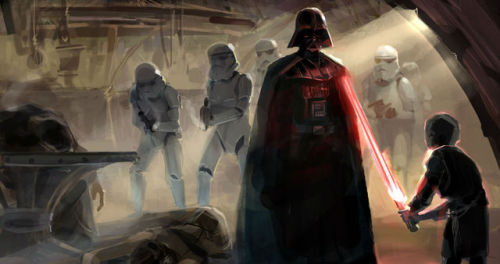
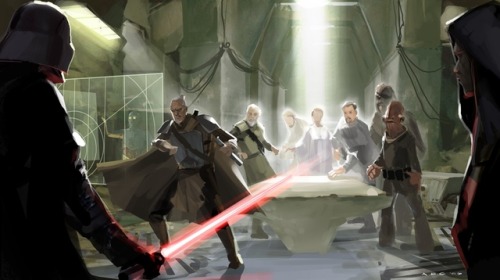

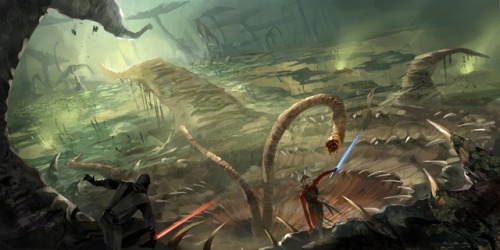


Star Wars: The Force Unleashed Concept Art // by Amy Beth Christenson
This made me sad, and made me happy, and has my entire heart.
What if Kel was executed for treason in Lady Knight? What if it caused a rebellion? Because you can't tell me that what the world will hear in canon isn't that Wyldon ordered her to follow the refugees. Anything else would create resentment. For all Wyldon's pretty talk, surely he noticed that. And if they tried to hush it up? I don't see Raoul and Alanna letting that happen. And if you knew your king executed nobles for rescuing commoners from a fate worse than death, wouldn't you rebel?
No, no, no, no I can’t do it. Kel is my lady, my light, my love–and I can’t imagine a world where the people on that war front would ever have allowed her death. So let’s tell this story–she was found guilty of treason. She was sentenced to death, kneeling on that Tortallan river mud, enemy territory a stone’s throw behind her, hundreds of abandoned souls saved by her stubborn hands.
Dutiful misery was stark in the grip Wyldon used to pull her to her feet and tie her hands behind her. (He would not leave that job to a lesser man.) Rage poured off Raoul, simmering, trapped. The King’s Own protested–when they shut themselves up it was not at their commander’s order but at Kel’s quelling shake of her head.
Wyldon could protect Owen, who was his squire and his responsibility. The King’s Own had technically, roughly, been following orders. The rescued civilians were ushered toward safety with faintly awed hands. Kel, Merric, and Neal were ushered forward, too, by awed hands, but it was with their own hands bound behind them and it was not toward safety.
But the awe was there– these knights had done the impossible. They had gone into enemy territory, after monsters made of death and metal, and saved their people. They had done the impossible– they had put protecting homeless peasants above obeying their lord. Wyldon tied each of their hands behind their backs and they did not apologize. Neal raised his chin like he was challenging Wyldon to demand it of him.
But the Giantkiller fortress was flooded with children and civilians who had been written off as collateral damage. After days of hard travel, the children were no longer unnaturally clean and coiffed; they would always be scared. They would always be brave. They would not allow Kel to be the price paid for their lives.
A pretty young woman who had once stabbed a Scanran slaver to death found out where they were keeping Kel and her knights. Children threw tantrums to distract while the ex-convicts picked the locks on their doors. Tobe got the horses and kept them quiet. When they got to the main gates again, Neal ready to put them all to sleep, the guards turned around the same way they had days before and let them through.
Up in the commander’s quarters, Wyldon slept restlessly. He had told Keladry of Mindelan once that he believed the best thing that could be said of his tenure as training master was that she had been in his care. He still believed that to be true, but he had his orders. When they woke him, he would be stranded somewhere between rage and relief.
Only a handful of Haven civilians came out into the woods with Kel that night. Neal tsked about Giantkiller’s healers and worked on them all while Merric went though their stolen saddlepacks and took inventory. Fanche pulled bread, cheese, and knives out of her bulging skirts and passed them around.
Kel sat, staring at the space they would have put a fire if they had thought it was safe to light one. Neal bullied some bread into her and Merric asked, “What do we do now, Kel?”
She considered saying, “Why are you asking me?” but Kel had always been very bad at lying to herself. She looked up at the trees. Fir. Spruce. “There’s a war on,” Kel said. “No matter what they say back there, we still have a sworn duty. Or at least I do.” Her school friends were looking up at her like she held their allegiances in her callused palm. The Haven people were careful shadows, tired, certain. Tobe looked at her like he was never letting her out of his sight again. “I’m going to keep fighting.”
They took down their first Scanran raiding party the next day, finding them almost on accident. The first Haven dogs and cats skipped and sauntered into their makeshift camp the next night, curling up by the fire and dropping rabbits for the humans to clean for them.
Haven civilians and convicts began wandering in, grinning tightly, bringing stories of Giantkiller all up in arms. After the first week, once she’d figured out they might be there for good, Kel had started looking for clerks.
When Dom and most of his squad of the King’s Own walked into their camp without a single piece of official Crown livery on, Kel seized Dom by one rough, plain sleeve and dragged him to the side.
“You can’t be here,” she hissed. “Neal and Merric are as damned as I am. The refugees have nowhere safer to go, and I’m not going to keep them from a fight if they want it. But you– Raoul needs you, Dom.”
“Raoul needs us to win this war,” said Dom. “And neither of us could think of any better hands for my squad to be in than yours. If we’re going to win this, we can’t keep our best commanders in the dark.” He grinned. “Even if they’re grumpy giantesses of fugitives.”
Keep reading
“6) Tolkien’s hero was average, and needed help, and failed. This is the place where most fantasy authors, who love to simultaneously call themselves Tolkien’s heirs and blame him for a lot of what’s wrong with modern fantasy, err the worst. It’s hard to look at Frodo and see him as someone extra-special. The hints in the books that a higher power did choose him are so quiet as to be unnoticeable. And he wouldn’t have made it as far as he did without his companions. And he doesn’t keep from falling into temptation. A lot of modern fantasy heroes are completely opposite from this. They start out extraordinary, and they stay that way. Other characters are there to train them, or be shallow antagonists and love interests and worshippers, not actually help them. And they don’t fail. (Damn it, I want to see more corrupted fantasy heroes.) It’s not fair to blame Tolkien for the disease that fantasy writers have inflicted on themselves. […] Fantasy could use more ordinary people who are afraid and don’t know what the hell they’re doing, but volunteer for the Quest anyway. It’s misinterpretation of Tolkien that’s the problem, not Tolkien himself.”
—
“Tolkien Cliches,” Limyaael
(via mithtransdir)
The whole point of The Lord Of The Rings… like, the WHOLE POINT… is that it is ultimately the hobbits who save the world. The small, vulnerable, ordinary people who aren’t great warriors or heroes.
Specifically, Sam. Sam saves the world. All of it. The ultimate success of the great quest is 100% due to a fat little gardener who likes to cook and never wanted to go on an adventure but who did it because he wasn’t going to let his beloved Frodo go off alone. Frodo is the only one truly able to handle the ring long enough to get it into Mordor - and it nearly kills him and permanently emotionally damages him - but Sam is the one who takes care of Frodo that whole time. Who makes him eat. Who finds him water. Who watches over him while he sleeps.
Sam is the one who fights off Shelob.
Sam is the one who takes the Ring when he thinks Frodo is dead.
Sam is the one who strolls into Orc Central and saves Frodo by sheer determination and killing any orc who crosses him. (SAM THE GARDENER GOES AND KILLS AN ACTUAL ORC TO GET FRODO SOME CLOTHES LET’S JUST THINK ABOUT THAT). And then Sam just takes off the Ring and gives it back which is supposed to be freaking impossible and he barely even hesitates.
Sam literally carries Frodo on the last leg of the journey. On his back. He’s half-starved, dying slowly of dehydration, but he carries Frodo up the goddamn mountain and Gollum may get credit for accidentally destroying the ring but Sam was the one who got them all there.
Sam saved the world.
And let’s not forget Pippin and Merry, who get damselled out of the story (the orcs have carried them off! We must make a Heroic Run To Save Them!) and then rescue themselves, recruit the Terrifying Ancient Powers through being genuinely nice and sincere, and overthrow Saruman before the ‘real’ heroes even get there.
Let’s not forget Pippin single-handedly saving what’s left of Gondor - and Faramir - by understanding that there is a time for obeying orders and a time for realizing that the boss is bugfuck nuts and we need to get help right now.
Let’s not forget Merry sticking his sword into the terrifying, profoundly evil horror that has chased him all over his world because his friend is fighting it and he’s gonna help, dammit and that’s how the most powerful Ringwraith goes down to a suicidally depressed woman and a scared little hobbit.
Everything the others do, the kings and princes and great heroes and all? They buy time. They distract the bad guys. They keep the armies occupied. That is what kings and great leaders are for - they do the big picture stuff.
But it is ultimately the hobbits who bring down every villain. Every one. And I believe that that is 100% on purpose. Tolkien was a soldier in WWI. His son fought in WWII. (And a lot of The Lord Of The Rings was written in letters to him while he did it.)
And hey, look, The Lord Of The Rings is about ordinary people - farmers, scholars, and so on - who get pulled into a war not of their making but who have to fight not only because their own home is in danger but so is everyone’s. And they’re small and scared but they do the best they can for as long as they can and that is what actually saves the world. Not great heroes and pre-destined kings. Ordinary people, doing extraordinary things because they want the world to be safe for ordinary people, the ones they know and the ones they don’t.
Ordinary people matter. They can save the world without being great heroes or kings or whatever. And that is really important and I get so upset when people miss that because Aragorn and Legolas and Gimli and Gandalf and all the others are great characters and all but they are ultimately a hobbit delivery system.
It is ordinary people doing their best who really change the world, and continue doing so after the war is over because they have to go home and rebuild and they do.
If nothing else, I have to reblog this for the phrase “hobbit delivery system.” So accurate it hurts.
(via elenilote)
What I love too is how even the foretold king and the assorted great heroes themselves all come to recognize that their main (and by the end, only) role is to distract Sauron. To the point that by the end they’re all gathered up before the black gates of Mordor in order to keep his attention focused on them, with only the hope - not the certainty - that they can buy Frodo whatever remaining time he needs, if he’s even still alive.
One thing the movies left out but has always been such a key part of the books for me was how when the hobbits returned home, they found that home had been changed too. The war touched everywhere. Even with all they did in far-off lands to protect the Shire, the Shire had still been damaged, both property and lives destroyed, and it wasn’t an easy or simplistically happy homecoming. They had to fight yet another battle (granted a much smaller one) to save their neighbours, and then spent years in rebuilding.
(via garrusscars)
In many ways, the entire POINT is that homecoming. A quest, an adventure, is defined by the return home, and the realization that not only have YOU changed, so has your home.
(via mymyriadmusings)
“My friends, you bow to no one.”
(via sorrelchestnut)
@daisyfornost
(via roselightfairy)
if anyone is need of a long, entertaining adventure with a hero who never set out to be a hero but was just TRYING TO DIG A TUNNEL DAMMIT, Ursula Vernon’s Digger and its delightful wombat heroine might be up your alley.
(via beatrice-otter)
this is all so good and important i only have to add as i am contractually obligated to do that gollum didn’t “accidentally” destroy the Ring, frodo’s geas took effect and kicked his ass when gollum broke his word, so the credit for that goes back to Frodo again who absolutely anticipated he would do so and set up the geas for just that reason
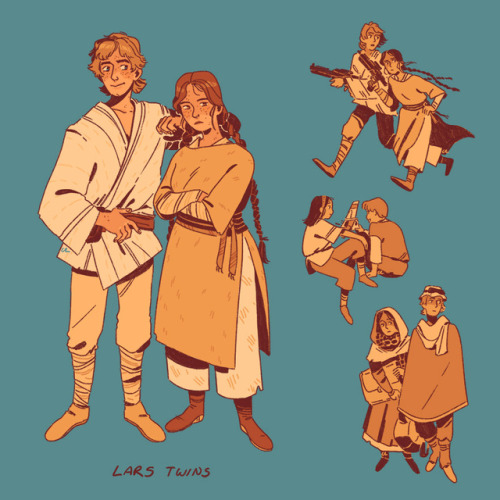
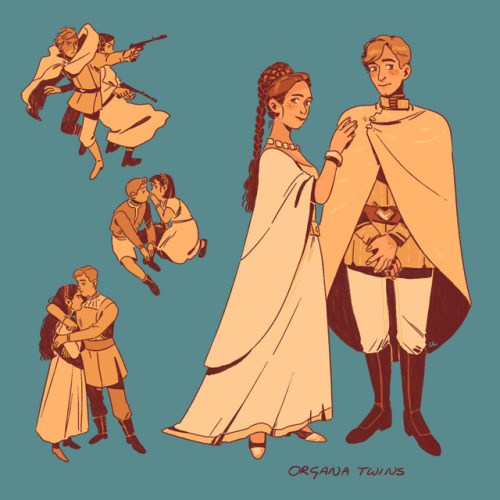
me, wandering shoeless through the snowy wastes of ao3: please… all i want is for luke and leia to have grown up together…… blease…………..
Yes... perfect...








the clone wars + onion headlines
Yes pls


It’s still possible that Delphi actually isn’t Voldemort’s daughter, but only believes that she is.
Why? Because of what J.K. Rowling herself recently posted on Pottermore, with the entry for Ilvermony School of Witchcraft and Wizardry.
J.K. Rowling wrote that the Gaunt family had at least one other branch, namely, in Ireland. Rionach Gaunt, a Pureblood witch and descendant of Salazar Slytherin, married the Pureblood wizard William Sayre in the late 1500’s/early 1600’s.
This is what Rowling writes in the article:
Isolt Sayre was born around 1603 and spent her earliest childhood in the valley of Coomloughra, County Kerry, in Ireland. She was the offspring of two pure-blood wizarding families (OP: Gaunt and Sayre).
Her father, William Sayre, was a direct descendant of the famous Irish witch Morrigan, an Animagus whose creature form was a crow. William nicknamed his daughter ‘Morrigan’ for her affinity for all natural things when she was young. Her early childhood was idyllic, with parents who loved her and were quietly helpful to their Muggle neighbours, producing magical cures for humans and livestock alike.
However, at five years old, an attack upon the family home resulted in the death of both of her parents. Isolt was ‘rescued’ from the fire by her mother’s estranged sister, Gormlaith Gaunt, who took her to the neighbouring valley of Coomcallee, or ‘Hag’s Glen,’ and raised her there.
Isolt Sayre later founded Ilvermorny School of Witchcraft and Wizardry. However, being a descendant of Slytherin, it’s heavily implied she could speak (or, at least understand) Parseltongue. Her “house” at Ilvermorny, Horned Serpent, was named after a [likely basilisk relative] she “could speak with and understand”.
According to J.K. Rowling:
Most fascinating of all to Isolt, was the great horned river serpent with a jewel set into its forehead, which lived in a nearby creek. Even her Pukwudgie guide was terrified of this beast, but to his astonishment, the Horned Serpent seemed to like Isolt. Even more alarming to William was the fact that she claimed to understand what the Horned Serpent was saying to her.
Isolt learned not to talk to William about her strange sense of kinship with the serpent, nor of the fact that it seemed to tell her things. She took to visiting the creek alone and never told the Pukwudgie where she had been. The serpent’s message never varied:
'Until I am part of your family, your family is doomed.’
Isolt had no family, unless you counted Gormlaith back in Ireland. She could not understand the Horned Serpent’s cryptic words, or even decide whether she was imagining the voice in which he seemed to speak to her.
Isolt had two daughters with her Muggle husband, James Steward: Martha, a Squib, and Rionach II, a witch.
Rionach II never married “in an effort to eradicate Slytherin’s bloodline”. However, her sister, Martha, did marry a Native American man from a local tribe.
According, again, to J.K. Rowling:
Rionach, the youngest of James and Isolt’s daughters, taught Defence Against the Dark Arts at Ilvermorny for many years. Rionach never married. There was a rumour, never confirmed by her family, that, unlike her sister Martha, Rionach was born with the ability to speak Parseltongue, and that she was determined not to pass on Slytherin ancestry into the next generation (the American branch of the family was unaware that Gormlaith was not the last of the Gaunts, and that the line continued in England).
[…] Martha, the elder of James and Isolt’s twins, was a Squib. Deeply loved though Martha was by her parents and adoptive brothers, it was painful for her to grow up at Ilvermorny when she was unable to perform magic.
She eventually married the non-magical brother of a friend from the Pocomtuc tribe, and lived henceforth as a No-Maj (Muggle).
In another interview, Rowling pointedly confirmed that Muggle-borns “are a result of Squibs intermarrying with Muggles, and magic showing up in the descendants of these unions several generations later”.
“Muggle-borns will have a witch or wizard somewhere on their family tree, in some cases many, many generations back. The gene resurfaces in some unexpected places.” - J.K. Rowling
Due to this, it’s entirely possible that Delphi is actually the long-lost descendant of Martha Steward, and thus, the other branch of the Gaunt family. She merely assumes she’s Lord Voldemort’s daughter, because she can speak Parseltongue.
If this is the case, Delphi would also likely be Muggle-born, or, at best, Half-blood.

If that’s the case, then why would Lord Voldemort and/or his followers have taken / stolen Delphi as a child?
This answer, too, can be found easily within the Ilvermony article. Voldemort’s distant relative, Gormlaith Gaunt, also stole away Isolt Sayre as a child for the following reasons, and later, also sought to steal Isolt’s daughters:
As Isolt grew older she came to realise that her saviour was in reality her kidnapper and the murderer of her parents. Unstable and cruel, Gormlaith was a fanatical pure-blood who believed that her sister’s helpfulness to her Muggle neighbours, was setting Isolt upon a dangerous path to intermarriage with a non-magical man. Only by stealing the child, Gormlaith believed, could their daughter be brought back to the 'right way’: raised in the belief that as a descendant of both Morrigan and Salazar Slytherin she ought to associate only with pure-bloods.
[…] Gormlaith refused to allow Isolt to take up her place at Hogwarts when the letter arrived, on the basis that Isolt would learn more at home than at a dangerously egalitarian establishment full of Mudbloods. However, Gormlaith herself had attended Hogwarts, and told Isolt a great deal about the school. In the main, she did this to denigrate the place, lamenting that Salazar Slytherin’s plans for the purity of wizardkind had not been fulfilled.
[…] She intended to lay waste to the second Ilvermorny, slaughter the parents who had thwarted her ambition of a great pure-blood family, steal her great nieces who were the last to carry the sacred bloodline, and return with them to Hag’s Glen.
Likewise, in the article on Pottermore about Draco Malfoy, Rowling wrote the following:
Draco was raised in an atmosphere of regret that the Dark Lord had not succeeded in taking command of the wizarding community, although he was prudently reminded that such sentiments ought not to be expressed outside the small circle of the family and their close friends, 'or Daddy might get into trouble’.
In childhood, Draco associated mainly with the pure-blood children of his father’s ex-Death Eater cronies, and therefore arrived at Hogwarts with a small gang of friends already made, including Theodore Nott and Vincent Crabbe.
Like every other child of Harry Potter’s age, Draco heard stories of the Boy Who Lived through his youth. Many different theories had been in circulation for years as to how Harry survived what should have been a lethal attack, and one of the most persistentwas that Harry [Potter] himself was a great Dark wizard.
The fact that he had been removed from the wizarding community seemed (to wishful thinkers) to support this view, and Draco’s father, wily Lucius Malfoy, was one of those who subscribed most eagerly to the theory.
It was comforting to think that he, Lucius, might be in for a second chance of world domination, should this Potter boy prove to be another, and greater, pure-blood champion.
It was, therefore, in the knowledge that he was doing nothing of which his father would disapprove, and in the hope that he might be able to relay some interesting news home, that Draco Malfoy offered Harry Potter his hand when he realised who he was on the Hogwarts Express.
Harry’s refusal of Draco’s friendly overtures, and the fact that he had already formed allegiance to Ron Weasley, whose family is anathema to the Malfoys, turns Malfoy against him at once. Draco realised, correctly, that the wild hopes of the ex-Death Eaters – that Harry Potter was another, and better, Voldemort – are completely unfounded, and their mutual enmity is assured from that point.

How and why would Lord Voldemort be in America in the first place?
I think this is also for a reason explained by Rowling in the Ilvermorny article: Voldemort was looking for the wand of Salazar Slytherin, which was buried on the grounds of Ilvermorny. (Or heard of a “powerful wand” being at Ilvermorny, and assumed it could be the Elder Wand.)
From J.K. Rowling:
Next, [Gormlaith] uttered a single sibilant word in Parseltongue, the language of snakes. The wand that had served Isolt so faithfully for many years quivered once on the bedstand beside her as she slept, and became inactive.
In all the years that she had lived with it, Isolt had never known that she held in her hand the wand of Salazar Slytherin, one of the founders of Hogwarts, and that it contained a fragment of a magical snake’s horn: in this case, a Basilisk. The wand had been taught by its creator to 'sleep’ when so instructed, and this secret had been handed down through the centuries to each member of Slytherin’s family who possessed it.
[…] Isolt screamed at James to go to the girls: she ran to assist her adoptive sons, Slytherin’s wand in her hand.
Only when she raised it to attack her hated aunt did she realise that for all the good it would do her, the sleeping wand might as well have been a stick she had found on the ground.
[…] Slytherin’s wand remained inactive following Gormlaith’s command in Parseltongue. Isolt could not speak the language, but, in any case, she no longer wanted to touch the wand that was the last relic of her unhappy childhood. She and James buried it outside the grounds.
Within a year, an unknown species of snakewood tree had grown out of the earth on the spot where the wand was buried. It resisted all attempts to prune or kill it, but after several years the leaves were found to contain powerful medicinal properties.
This tree seemed testament to the fact that Slytherin’s wand, like his scattered descendants, encompassed both noble and ignoble. The very best of him seemed to have migrated to America.
But who could speak Parseltongue, aside from Harry, in the series? Lord Voldemort. A man who, even as Tom Riddle, as seen in Chamber of Secrets, had an unhealthy obsession with Salazar Slytherin.
“You see?” he whispered. “It was a name I was already using at Hogwarts, to my most intimate friends only, of course. You think I was going to use my filthy Muggle Father’s name forever? I, in whose veins runs the blood of Salazar Slytherin’s himself, through my mother’s side? I, keep the name of the foul, common muggle, who abandoned me even before I was born, just because he found out his wife was a witch? No, Harry — I fashioned myself a new name, a name I knew wizards everywhere would one day fear to speak, when I had become the greatest sorcerer in the world!”
[…] “Well, he certainly kept an annoyingly close watch on me after Hagrid was expelled,” said Riddle carelessly. “I knew it wouldn’t be safe to open the Chamber again while I was still at school. But I wasn’t going to waste those long years I’d spent searching for it. I decided to leave behind a diary, preserving my sixteen-year-old self in its pages, so that one day, with luck, I would be able to lead another in my footsteps, and finish Salazar Slytherin’s noble work.” - Tom Riddle, Chamber of Secrets
Likewise, we all know that Lord Voldemort greatly coveted Founders’ items - and Slytherin’s wand would have the perfect object to turn into another one of his Horcruxes.
Had Voldemort not sought the Elder Wand, likely, he would have also done anything in his power to lay his claim to Salazar Slytherin’s wand. This is especially true, given that he robs Dumbledore’s grave just in order to obtain the Elder Wand.
Likewise, by finding out how (and why) Salazar Slytherin’s wand ended up in America in the first place, Voldemort would also learn…that he was not the last of Slytherin’s decendants. That Slytherin’s descendants may still exist, alive and well, in America, through descent from Martha Steward.
Likewise, during the books, Voldemort travelled far and wide, according to Harry. We know that he travelled to Germany (Nurmengard) to interogate Gellert Grindelwald. Voldemort also travelling to America wouldn’t be much of a stretch.

If she isn’t Voldemort’s daughter, then why does Delphi have blue-silvery hair and other magical powers?
I believe that this may be due to several reasons: namely, as a descendant of William Sayre, Delphi would also be descended from the Irish witch Morrigan. Morrigan was stated to be a powerful witch and an Animagus, one who took on the form of a crow.
In Irish lore, Morrigan was known as “the Morrígan”, which means “the phantom queen”, or “Mórrígan”, “the great queen”.
However, “Morrigan” also refers to a type of creature in the earliest source material - “a monster in female form, that is, a morrígan”. (“morrígna” is the plural term used)
Likewise, in traditional Irish lore, Morrigan could turn into other animals besides a crow.
In response she intervenes in his next combat, first in the form of an eel who trips him, then as a wolf who stampedes cattle across the ford, and finally as a white, red-eared heifer leading the stampede… (Wikipedia)
This would indicate that Morrigan, though believed to be a witch, may actually be something more along the lines of a Veela.
“Veela are semi-human magical beings; beautiful women with white-gold hair and skin that appears to shine moon-bright. When angry, Veela take on a less pleasant appearance; their faces elongate into sharp, cruel-beaked bird heads, and long scaly wings burst from their shoulders.” (HP Wiki)
Likewise, we know that Veela, as seen with the Delacour family, can intermarry and have children with humans (namely, wizards).
Veela have been known to marry wizards, although it is unknown whether any have married Muggles. Children of these unions are half-Veela, and they will inherit magical ability from their fathers and beauty and charm from their mothers. Veela traits seem to persist for at least a few generations. These traits only show up in females, the daughters of their offspring. Apolline Delacour is a half-Veela, thus her children Fleur and Gabrielle are quarter-Veela, and Fleur’s children Victoire, Dominique, and Louis are eighth-Veela; it is unknown if they have inherited any specific Veela characteristics from their grandmother. It is unknown whether half-blooded Veela can throw fire or transform into harpy-like creatures, as their full-blooded relatives can. (HP Wiki)
However, Delphi’s appearance may also point to Veela ancestry much sooner in her family tree. If this is the case, and Delphi is part-Veela, then that would also explain Albus Potter’s “crush” on her.
[Veela] magic creates an “entranced” effect, as noted in the books and hinted in the movie, wherein men (presumed to be heterosexual) fall into a trance-like stance, similar to the Imperio charm, in which they lose sight of their surroundings and focus solely on the Veela’s dance or appearance. Men are also prone to experiencing thoughts of strong desire to impress or be with the veela in question, and are strongly attracted romantically. (HP Wiki)

But a crow isn’t the same as an augurey, and Delphi is “the augurey”, not “the crow”!
True. However, the augurey physically resembles, and shares symbolic traits, with crows, such as black feathering with a green-or-blue hue, or being an “omen of death”. Likewise, you know what else the augurey is called in Harry Potter mythology? “The Irish phoenix”.
Morrigan is, her her core, an Irish figure. Likewise, Isolt Sayre came from the Irish branch of the Gaunt family, which was thought to have died out [Pureblood-wise] with Gormlaith Gaunt’s death. From what we know, Lord Voldemort came from the English branch.
From the HP Wiki:
The Augurey, also known as the Irish Phoenix, is a thin and mournful looking bird, somewhat like a small underfed vulture in appearance, with greenish black feathers and a sharp beak. Its diet consists of insects, fairies and flies, which it hunts for in the heavy rain. Intensely shy, the Augurey lives in a tear-shaped nest in thorn and brambles.
It is native to Great Britain and Ireland, but is also found in Northern Europe. It was long believed that the mournful cry of the Augurey foretold death, and wizards would go to great lengths to avoid Augurey nests. However, research determined that the Augurey merely sings when it is about to rain.
The term “augury” most commonly refers to a method of divination by studying the flight patterns of birds.
However, Morrigan also had a large connection with divination and death. In lore, she is also said to be a Seer and diviner, warning heroes of their impending demise:
Her role was to not only be a symbol of imminent death, but to also influence the outcome of war.
Most often she did this by appearing as a crow flying overhead, and would either inspire fear or courage in the hearts of the warriors. In some cases, she is written to have appeared in visions to those who are destined to die in battle by washing their bloody armor. In this specific role, she is also given the role of foretelling imminent death, with a particular emphasis on the individual. (Wikipedia)
Likewise, Delphi’s very name all but means 'prophecy’. Delphi [in Greece] is perhaps best known for the oracle of the Pythia, who would give prophecies in a trance, which equates with Seers in the Harry Potter world.
A Seer from history, mythology, and lore - just like Morrigan.

If that’s the case, what happened to Delphi’s true parents?
Likley killed by Voldemort and/or Voldemort’s followers, especially since Martha Steward’s decendants would largely be of Muggle ancestry, maybe with a Half-bloods and Muggle-borns mixed in.
In Voldemort’s eyes, they would have “defiled” Slytherin’s bloodline.




Andromeda’s Golden Worlds - Series 1
This is something I’ve been wanting to do ever since the game was announced - space propaganda location posters for all of the habitable worlds. Now that I’ve finally finished the story, I can get started on them!
This is series 1 with Eos, Havarl, Voeld, and H-047C. Series 2 will cover Elaaden, Kadara, Habitat-7, and Aya (feel like it belongs in the lineup).
Prints available at my Society6 store if anyone wants!

Hawke family fleeing the Blight
I have some thoughts on my Hawke having to deal with another Blight and keeping her family safe again. But that's too long for this post, so I'm just gonna add it to my list of Dragon Age fics that I still need to finish...







First week of #31daysofharry challenge :)
-
 sewingcircuits liked this · 1 week ago
sewingcircuits liked this · 1 week ago -
 asha10100101010 reblogged this · 1 week ago
asha10100101010 reblogged this · 1 week ago -
 houseatriedes reblogged this · 1 week ago
houseatriedes reblogged this · 1 week ago -
 bat-74 liked this · 2 weeks ago
bat-74 liked this · 2 weeks ago -
 anewbrainjughead reblogged this · 2 weeks ago
anewbrainjughead reblogged this · 2 weeks ago -
 towerprincebait reblogged this · 2 weeks ago
towerprincebait reblogged this · 2 weeks ago -
 strangebee3 liked this · 2 weeks ago
strangebee3 liked this · 2 weeks ago -
 sadbitchitis liked this · 2 weeks ago
sadbitchitis liked this · 2 weeks ago -
 vamppeach reblogged this · 3 weeks ago
vamppeach reblogged this · 3 weeks ago -
 her-canine-teeth reblogged this · 3 weeks ago
her-canine-teeth reblogged this · 3 weeks ago -
 strike-me-down liked this · 3 weeks ago
strike-me-down liked this · 3 weeks ago -
 gladtheimpaler liked this · 3 weeks ago
gladtheimpaler liked this · 3 weeks ago -
 barelyawakeworld reblogged this · 3 weeks ago
barelyawakeworld reblogged this · 3 weeks ago -
 firefright liked this · 3 weeks ago
firefright liked this · 3 weeks ago -
 nellasbookplanet reblogged this · 3 weeks ago
nellasbookplanet reblogged this · 3 weeks ago -
 swagmagussupreme reblogged this · 3 weeks ago
swagmagussupreme reblogged this · 3 weeks ago -
 fall-like-lightning liked this · 3 weeks ago
fall-like-lightning liked this · 3 weeks ago -
 barelyawakeworld liked this · 3 weeks ago
barelyawakeworld liked this · 3 weeks ago -
 seriouslylikewow liked this · 4 weeks ago
seriouslylikewow liked this · 4 weeks ago -
 greatsilverini reblogged this · 4 weeks ago
greatsilverini reblogged this · 4 weeks ago -
 windowclimbinggremlin liked this · 4 weeks ago
windowclimbinggremlin liked this · 4 weeks ago -
 32bees liked this · 4 weeks ago
32bees liked this · 4 weeks ago -
 badass-at-cuddling reblogged this · 4 weeks ago
badass-at-cuddling reblogged this · 4 weeks ago -
 ros-iq liked this · 4 weeks ago
ros-iq liked this · 4 weeks ago -
 ocdwaffles liked this · 1 month ago
ocdwaffles liked this · 1 month ago -
 nochnye-vedmy liked this · 1 month ago
nochnye-vedmy liked this · 1 month ago -
 makemassiveprincess liked this · 1 month ago
makemassiveprincess liked this · 1 month ago -
 interviewwithcarmilla reblogged this · 1 month ago
interviewwithcarmilla reblogged this · 1 month ago -
 somewheredisappointingjesus24 reblogged this · 1 month ago
somewheredisappointingjesus24 reblogged this · 1 month ago -
 somewheredisappointingjesus24 liked this · 1 month ago
somewheredisappointingjesus24 liked this · 1 month ago -
 marinkin reblogged this · 1 month ago
marinkin reblogged this · 1 month ago -
 snaso102 liked this · 1 month ago
snaso102 liked this · 1 month ago -
 khanimtrul liked this · 1 month ago
khanimtrul liked this · 1 month ago -
 this-art-i-like-it reblogged this · 1 month ago
this-art-i-like-it reblogged this · 1 month ago -
 skywalkersan liked this · 1 month ago
skywalkersan liked this · 1 month ago -
 obeetlebeetle liked this · 1 month ago
obeetlebeetle liked this · 1 month ago -
 camillahex reblogged this · 1 month ago
camillahex reblogged this · 1 month ago -
 ourladyoflazarus reblogged this · 1 month ago
ourladyoflazarus reblogged this · 1 month ago -
 gidguard liked this · 1 month ago
gidguard liked this · 1 month ago -
 acebender reblogged this · 1 month ago
acebender reblogged this · 1 month ago -
 newbornnebulae liked this · 1 month ago
newbornnebulae liked this · 1 month ago -
 theroseandthebeast reblogged this · 1 month ago
theroseandthebeast reblogged this · 1 month ago -
 wsoupofpain reblogged this · 1 month ago
wsoupofpain reblogged this · 1 month ago -
 clytemnestra-was-right liked this · 1 month ago
clytemnestra-was-right liked this · 1 month ago -
 ashleyfonthescreamofcreation liked this · 1 month ago
ashleyfonthescreamofcreation liked this · 1 month ago -
 maoist-mizer reblogged this · 1 month ago
maoist-mizer reblogged this · 1 month ago -
 miniaturecowboymongerturtle liked this · 1 month ago
miniaturecowboymongerturtle liked this · 1 month ago -
 dykeson-sphere reblogged this · 1 month ago
dykeson-sphere reblogged this · 1 month ago -
 uncrushedvelvet reblogged this · 1 month ago
uncrushedvelvet reblogged this · 1 month ago -
 littleladymab reblogged this · 1 month ago
littleladymab reblogged this · 1 month ago







